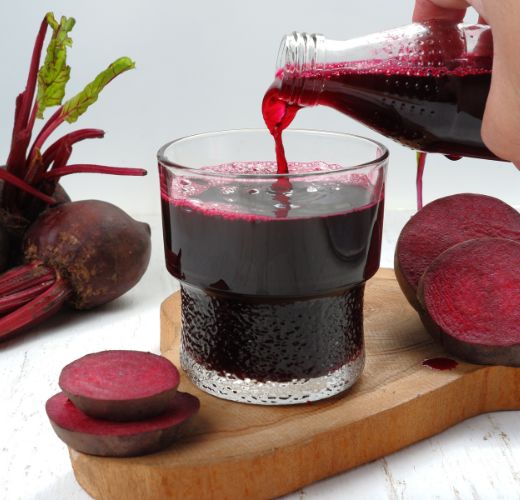From Beet to Beverage: The Art Of Juicing Beetroot
Welcome to our comprehensive guide on juicing beetroot with a cold press juicer. In this article, we’ll explore all the health benefits, nutritional richness, juicing techniques and recipes surrounding this vibrant root vegetable.
Beetroot, often dubbed as a superfood, packs a powerful punch of nutrients and antioxidants, making it a prized addition to any diet. From supporting cardiovascular health and boosting exercise performance to combating inflammation and promoting detoxification, beetroot offers an array of benefits for your overall well-being.
Diving into the nutritional profile of beetroot reveals a treasure trove of vitamins, minerals and phytonutrients. Loaded with vitamin C, potassium, manganese and dietary fiber, beetroot juice provides essential nutrients to support immune function, bone health and digestive wellness. Its high antioxidant content, including betalains and polyphenols, also helps protect cells from oxidative damage and reduce the risk of chronic diseases.
Discovering how to juice beetroot with a juicer unlocks the full potential of this nutrient-rich vegetable. The gentle extraction process of a cold press juicer ensures minimal heat exposure, preserving the delicate vitamins, minerals and enzymes present in beetroot juice. We’ll provided step-by-step instructions to help you make the most of your juicer and create delicious beetroot juice blends at home.
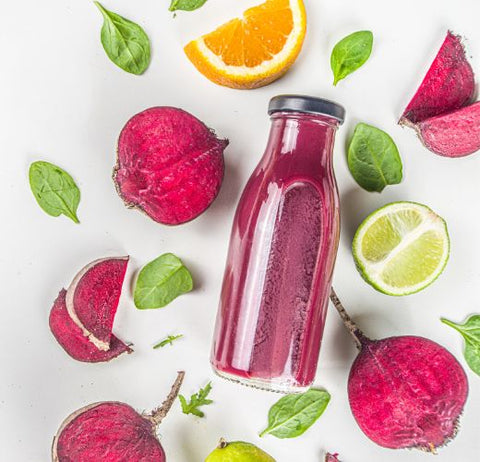
But our exploration doesn’t end there. We’ll also share mouthwatering recipes that showcase the versatility of beetroot juice, from refreshing juices and creamy smoothies to savory dips and vibrant salads. These recipes are designed to nourish your body with all the goodness of beetroot.
We’ll address common questions and concerns about juicing beetroot, including storage tips, potential side effects and creative serving suggestions. Whether you’re already a juicing enthusiast or a newcomer to the world of beetroot, this article is your ultimate guide to harnessing the nutritional power of beetroot with a cold press juicer. Let’s embark on a journey to vibrant health with the power of beetroot juice!
Beetroot Juice Health Benefits Revealed
Juicing beetroot with a juicer has emerged as a popular health trend, owing to its numerous health benefits. Beetroots, known for their vibrant purple color and earthy flavor are packed with essential nutrients that can be efficiently extracted through the gentle process of cold press juicing. This method preserves the integrity of the nutrients, resulting in a potent and flavorful juice that offers a wide range of health benefits.
One of the most notable health benefits of juicing beetroot is its positive impact on cardiovascular health. Beetroots are rich in dietary nitrates, which are converted into nitric oxide in the body. Nitric oxide helps to relax and dilate blood vessels, promoting improved blood flow and circulation. As a result, regular consumption of beetroot juice has been associated with lower blood pressure levels and a reduced risk of heart disease and stroke.
Furthermore, beetroot juice is a powerhouse of antioxidants, including betalains and polyphenols. These compounds help to combat oxidative stress and inflammation in the body, protecting cells from damage and reducing the risk of chronic diseases such as cancer and diabetes. The anti-inflammatory properties of beetroot juice may also alleviate symptoms associated with conditions like arthritis and promote overall well-being.
Additionally, beetroot juice is an excellent source of essential vitamins and minerals, including vitamin C, potassium, and folate. Vitamin C supports immune function and collagen production, while potassium helps to regulate blood pressure and fluid balance in the body. Folate is essential for DNA synthesis and cell division, making it particularly important during periods of growth and development.
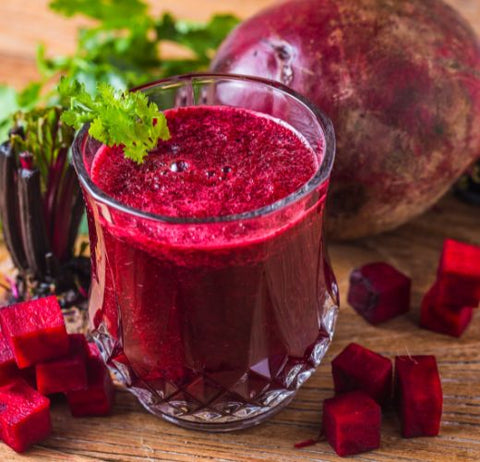
Another significant health benefit associated with juicing beetroot is its potential to improve exercise performance. Studies have shown that the nitrates present in beetroot juice can enhance oxygen utilization and increase endurance during physical activity. Athletes and fitness enthusiasts often incorporate beetroot juice into their pre-workout routine to boost energy levels and maximize performance.
Beetroot juice may also have detoxifying effects on the liver and promote healthy digestion. The fiber content in beetroot helps to support regular bowl movements and maintain gut health. The detoxifying properties of beetroot juice are believed to help flush out toxins from the body, promoting overall detoxification and cleansing.
Juicing beetroot with a cold press juicer offers a convenient and delicious way to reap the numerous health benefits of this nutritious root vegetable. From supporting cardiovascular health and reducing inflammation to enhancing exercise performance and promoting detoxification, beetroot juice is a valuable addition to any healthy diet. Incorporating this vibrant and nutrient-rich juice into your daily routine can contribute to improved health and vitality.
Beetroot Juice Nutrition Breakdown
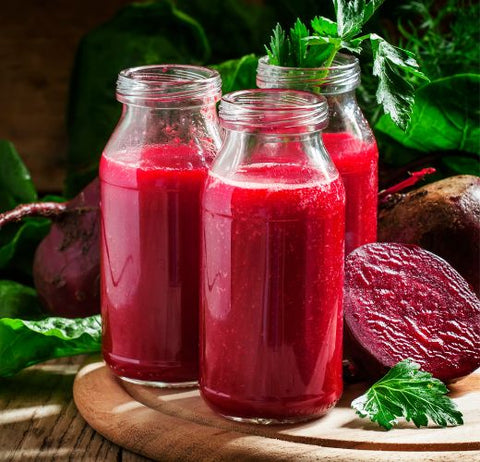
Beetroot juice boasts a rich nutritional profile, making it a popular choice for those looking to boost their intake of essential vitamins, minerals and antioxidants. This vibrant purple juice is extracted from the root vegetable and offers a wide array of health benefits. Let’s dive into the nutritional profile of beetroot juice:
- Vitamins: Beetroot juice is a rich source of vitamins including vitamin C, vitamin B6, folate (vitamin B9) and vitamin K1. Vitamin C is an antioxidant that supports immune function and collagen production. Vitamin B6 is important for metabolism and nervous system health, while folate is crucial for DNA synthesis and cell division. Vitamin K1 plays a key role in blood clotting and bone health.
- Minerals: Beetroot juice is packed with essential minerals such as potassium, manganese, magnesium and iron. Potassium helps regulate blood pressure in the body, while manganese supports bone health and the metabolism. Magnesium is involved in over 300 biochemical reactions in the body and is important for muscle and nerve function. Iron is essential for oxygen transport and energy production.
- Dietary Fibre: While beetroot juice is lower in fiber compared to whole beetroots, it still contains a moderate amount of dietary fiber. Fiber promotes digestive health by supporting regular bowel movements and prevents constipation. It also helps to regulate blood sugar levels and contribute to weight management.
- Antioxidants: Beetroot juice is rich in antioxidants, particular betalains and polyphenols. Betalains give beetroots their vibrant color and have been shown to exhibit anti-inflammatory and detoxifying properties. Polyphenols help to combat oxidative stress and protect cells from damage caused by free radicals. These antioxidants may contribute to overall health and longevity.
- Nitrate Content: Beetroots are one of the richest dietary sources of nitrates, which are naturally occurring compounds found in certain vegetables. When consumed, nitrates are converted into nitric oxide in the body, which helps to relax and dilate blood vessels, leading to improved blood flow and lower blood pressure. This can have beneficial effects on cardiovascular health and exercise performance.
- Low Calories And Fat: Beetroot juice is low in calories and fat, making it a nutritious addition to a balanced diet. It provides hydration and essential nutrients without adding excess calories or unhealthy fats.
Overall, beetroot juice offers a potent combination of vitamins, minerals, antioxidants, and other bioactive compounds that contribute to its numerous health benefits. Whether enjoyed on its own or combined with other fruits and vegetables in smoothies or juices, beetroot juice is a delicious beverage that can support overall health and well-being.
Juice Beetroot Like A Pro
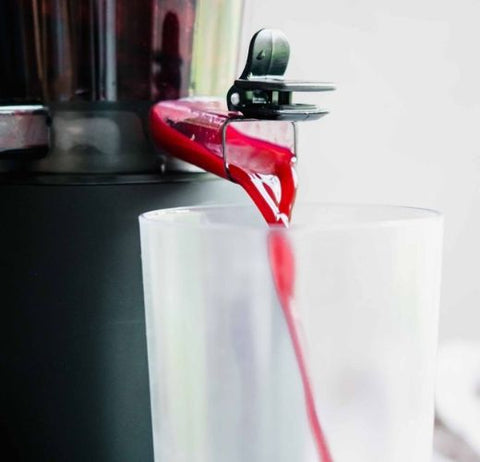
Juicing beetroot with a cold press juicer is a simple and rewarding process that allows you to extract all the nutrients from this vibrant vegetable. Cold press juicers, also known as masticating juicers, operate at low speeds and gently crush the produce to extract juice without generating heat, thereby preserving the integrity of the nutrients. Here’s a step-by-step guide on how to juice beetroot with a cold press juicer:
- Select Fresh Beetroot: Start by choosing fresh, firm beetroot from your local grocer or supermarket. Look for beetroots that are smooth, firm and free from blemishes or soft spots. Organic beetroot is preferable if available as it may contain higher levels of nutrients and fewer pesticides.
- Wash And Prepare: Thoroughly wash the beetroot under cold running water to remove any dirty or debris. Trim off the leafy greens and any remaining stems, leaving only the bulbous root. You can save the beet greens for use in salads and other recipes.
- Cut Into Pieces: Depending on the size of your cold press feeding chute, you may need to cut the beetroot into smaller pieces to fit. Aim for pieces that are manageable for the juicer to process easily, typically 1-2 inches in diameter.
- Set Up Your Cold Press Juicer: Assembly your juicer according to the instructions. Ensure that all components are clean and properly assembled before beginning the juicing process. Cold press juicers like the Optimum 600XXL cold press juice machine, Optimum H3000 2nd Generation and Optimum 600M are excellent for juicing beetroot.
- Juicing Process: Turn on the cold press juicer and begin feeding the beetroot pieces into the feeding chute one at a time. Use the pusher provided with the juicer to gently guide the beetroot down into the juicing bowl. Allow the juicer to slowly extract the juice from the beetroot, yielding a rich, vibrant liquid.
- Collect The Juice: Place a juice cup under the juice spout to collect the freshly extracted beetroot juice. Cold press juicers typically produce less foam and oxidation compared to other types of juicers, resulting in a smoother and more nutrient-dense juice.
- Enjoy Your Beetroot Juice: Once you have extracted the desired amount of beetroot juice, turn off the juicer and pour the juice into a glass. You can drink the beetroot juice as is or mix it with other fruits and vegetables for a delicious blend. Enjoy your homemade beetroot juice immediately for the best flavor and nutritional benefits.
Juicing beetroot with a cold press juicer is a quick and easy way to incorporate this nutrient-packed vegetable into your diet, providing a refreshing and health-boosting drink that can be enjoyed any time of the day.
Brillant Beetroot Juice Recipes
Incorporating beetroot juice into your culinary repertoire can add bursts of color, flavor and nutrition to your diet. Utilizing a cold press juicer ensures that you retain the maximum nutritional benefits of beetroot juice while enjoying its versatile taste. Here are three delicious recipes featuring beetroot juice made from a cold press juicer:
Beetroot Booster Juice
Ingredients: 2 medium-sized beetroots washed and trimmed, 2 large carrots washed and trimmed, 1-inch piece of fresh ginger peeled.
Recipe: Feed the beetroots, carrots and ginger through the cold press juicer, alternating between ingredients for even juice extraction. Stir juice to combine flavors and serve chilled over ice for a refreshing and nutritious drink packed with antioxidants and anti-inflammatory properties.
Beetroot, Apple and Kale Smoothie
Ingredients: 1 medium-sized beetroot washed and trimmed, 1 green apple cored and chopped, handful of kale leaves washed and destemmed, ½ cup of coconut water, juice of ½ lemon.
Recipe: Juice the beetroot using a cold press juicer and place in blender jug. Add chopped apple, kale leaves, coconut water and lemon to blender jug. Blend on high speed until smooth and creamy. Pour smoothie into glasses and garnish with a slice of apple or a sprinkle of chia seeds for added texture and nutrients.
Beetroot Hummus
Ingredients: 1 can of chickpeas drained and rinsed, ¼ cup tahini, ¼ cup freshly squeezed beetroot juice, 2 cloves garlic minced, juice of 1 lemon, 2 tablespoons olive oil, salt and pepper to taste.
Recipe: In a blender jug, combine chickpeas, tahini, beetroot juice, minced garlic, lemon juice and olive oil. Blend on high speed until smooth and creamy, scraping down the sides of the jug as needed. Season with salt and pepper and transfer to a serving bowl and drizzle with extra olive oil. Serve with fresh vegetable crudites, pita bread or cracked for a vibrant and nutritious appetizer.
Red Beetroot Pasta
Ingredients: 100g cooked beetroot, 150g Greek yogurt, garlic (to taste) - 75g feta cheese, olive oil (for drizzling), 40g cashew nuts, salt and pepper (to taste), a pinch of sugar
Recipe: Blend cooked beetroot, cashew nuts, and garlic until smooth. Mix in Greek yogurt until creamy. Add crumbled feta cheese. Season with salt, pepper, and a pinch of sugar. Drizzle with olive oil. Toss the sauce with your cooked pasta until well coated and serve. Enjoy your Beetroot and Feta Pasta!
These recipes showcase the versatility of beetroot juice made from a cold press juicer, allowing you to incorporate this nutritious ingredient into your daily meals and snacks with ease. Whether you prefer a refreshing juice, a creamy smoothie, or a flavourful dip, beetroot juice adds a vibrant touch to your culinary creations while providing a host of health benefits.
There are also other ways to use beetroot. The homemade beet powder recipe has been gaining popularity in the last few years for a number of reasons. Many people use it as a supplement to help lower blood pressure or to boost energy and help detox. But mostly it has become popular due to its beautiful colour.
The Beet Goes On
Juicing beetroot with a cold press juicer offers a convenient and delicious way to unlock all the nutrient-packed benefits of this root vegetable. Throughout this guide, we’ve explored the remarkable nutritional profile of beetroot, from its abundance of vitamins, minerals and antioxidants to its potential to support cardiovascular health, boost exercise performance and promote overall well-being.
By understanding how to juice beetroot with a cold press juicer, you can harness the full nutritional potential of this vibrant vegetable while preserving its delicate flavors and health-enhancing properties. With simple step-by-step instructions, we’ve provided you with the tools to create refreshing beetroot juices, vibrant smoothies and flavorful dips that will tantalize your taste buds.
Our collection of mouthwatering recipes showcases the versatility of beetroot juice, demonstrating how it can be incorporated into a wide range of dishes to add color, flavor and nutritional value. From zesty juices to creamy smoothies and dips, there’s something for everyone to enjoy.
Whether you’re looking to boost your immune system, support your cardiovascular health, or simply add more nutrient-rich foods to your diet, juicing beetroot with a cold press juicer is a delicious and convenient way to achieve your wellness goals. So, grab your cold press juicer, stock up on fresh beetroots, and let beetroot juice brighten your day and nourish your body from the inside out. Here’s to your health and vitality with every sip!
Explore the full Optimum juicers here. Find out more about juicing beetroot with our FAQ’s below!
Frequently Asked Questions
Is it necessary to peel beetroot before juicing? While it’s not necessary to peel beetroot before juicing, it’s recommended to wash the beetroot thoroughly to remove any dirt or debris. If the beetroot is organic and the skin is clean, you can juice it with the skin intact. However, if you prefer a smoother texture, you can peel the beetroot before juicing.
Can I juice beetroot leaves along with the root vegetable? Yes you can juice beetroot leaves along with the root vegetable. Beetroot leaves, also known as beet greens, are nutritious and can add a slightly earthly flavor to juice. However, be sure to wash the leaves thoroughly and trim any tough stems before juicing.
Can I mix beetroot juice with other fruits and vegetables? Yes beetroot juice can be mixed with other fruits and vegetables to create delicious and nutritious juice blends. Some popular combinations include beetroot with apple, carrot, ginger, lemon, or kale. Experiment with different ingredients to find your favorite flavor combinations.
How long does beetroot juice last when it’s made with a cold press juice? Beetroot juice made with a cold press juicer typically lasts for up to 2-3 days when stored in an airtight container in the fridge. However, for the best flavor and nutritional quality, it’s recommended to consume beetroot juice as soon as possible after juicing.
Are there any side effects of consuming beetroot juice? While beetroot juice is generally safe for most people to consume, it may cause temporary side effects such as red or pink urine and stools, known as beeturia. This discoloration is harmless and usually resolves on its own. However, if you experience digestive discomfort or allergic reactions after consuming beetroot juice, it’s best to consult with your healthcare professional.
Can beetroot juice help lower blood pressure? Yes beetroot juice has been shown to have blood pressure lowering effects to its high nitrate content, which is converted into nitric oxide in the body. Nitric oxide helps to relax and dilate blood vessels, leading to improved blood flow and lower blood pressure. However, individuals with low blood pressure or those taking medication for high blood pressure should consult with a healthcare professional before consuming beetroot juice regularly.


